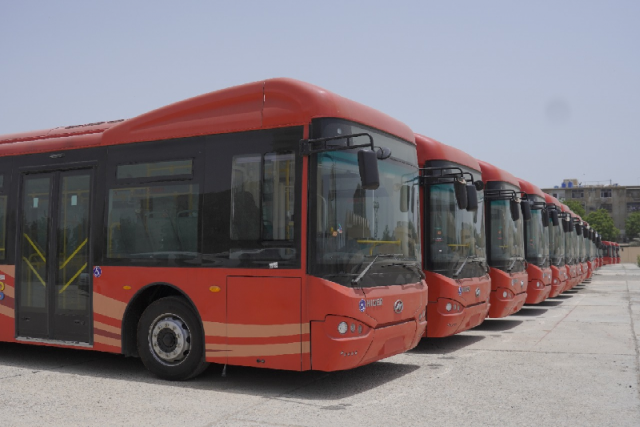Night routes of buses dwindle
Multiple issues plague Karachi’s public transport made worse by provincial government’s incompetence

Over a decade ago, getting around in Karachi in the dead of the night was considerably easy as multiple bus services would ply the port city’s roads but not anymore.
During the last 15 years, owing to factors like the rise of illegal rickshaws, high cost of diesel, and an increase in street crime, around 380 public transport routes have been closed in the city, as per a survey conducted by The Express Tribune. Among the routes that were discontinued, a significant number were used by public transport vehicles which would operate until 3am. At that time, the vehicles on the popular W-11 route would run round the clock.
Presently, only one or two buses operate until 2am on the D-7 route. Vehicles on the popular W-11 route offer their services until 11pm.
Amir Raza, who drives a bus on the W-11 route, when asked about route closures and the lack of public transport at night, replied: “Some 280 vehicles used to ply the W-11 route round the clock until 2005. After that the public transport system went downhill.”
When asked about the reasons for the decline, Raza said that sky-high diesel prices, illegal Qingqi (pronounced chinchi locally) rickshaws operating on the same route, and a string of robberies in the buses resulted in transporters of the route going out of business.
Consequently, the W-11 route’s reputation as a reliable night-time route was ruined and now only about 80 vehicles operate on it, Raza continued.
The lower number of vehicles and operations closing early means that night shift workers like Najma Ahmed struggle to find a ride home. “My shift ends at 3am. In the past, I would use the buses which operated on the W-11 route. But now, I either have to take an expensive cab or wait for other nurses to get free so we can carpool,” lamented Ahmed, who works as a nurse at the Civil Hospital in downtown Karachi.
It warrants mention that The Express Tribune’s survey implies that the closure of routes and subsequent decline in number of transporters impacts many more like Ahmed. The survey reveals that for a city, whose headcount is upward of 17 million, the number of public transport vehicles is incredibly low.
Private transporters operate about 3,000 to 4,000 buses, minibuses, and coaches. The government owned People’s Bus Service operates 200 vehicles. Eighty buses operate under the Green Line Bus Rapid Transit (BRT) and 20 buses are run on the Orange Line BRT.
Commenting on the dearth of public transport vehicles and routes for one of the most populated cities in the world, an emphatic Irshad Bukhari, the president of Karachi Transport Ittehad, held the Sindh government responsible. “This governance failure is evidenced by the traffic police’s failure to get illegal rickshaws off the roads. Moreover, the incompetence of the government in building infrastructure has also dented the public transport system,” remarked Bukhari.
Abdul Haleem Shaikh, the secretary at the transport department, does not agree with Bukhari’s assessment. “The government is currently running the cheapest bus service in the province,” he claimed.
When quizzed about the lack of night-time routes, Shaikh retorted that the number of passengers late in the night was minimal. “Hence operating the buses at that time is not feasible,” he justified.
The Express Tribune also questioned the secretary about the dearth of buses for the city’s ever-increasing population. “The Red Line BRT project is under construction and will be a game changer for the city’s people,” he promised.
Published in The Express Tribune, March 24th, 2023.



















COMMENTS
Comments are moderated and generally will be posted if they are on-topic and not abusive.
For more information, please see our Comments FAQ